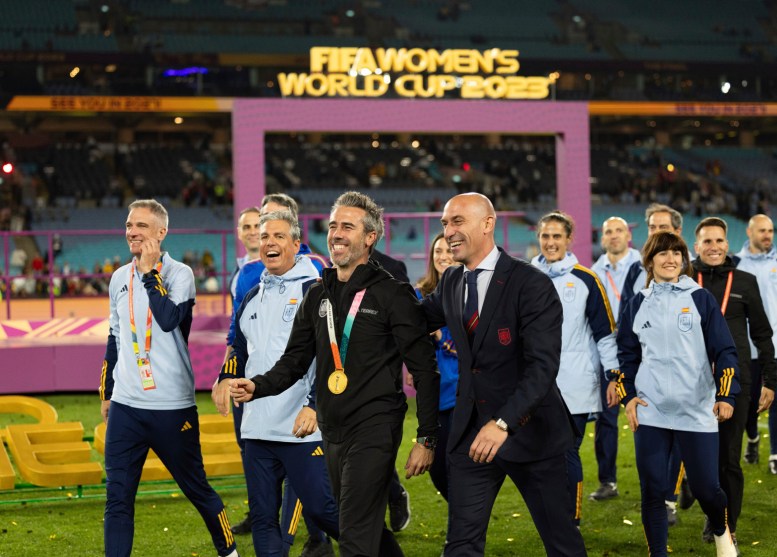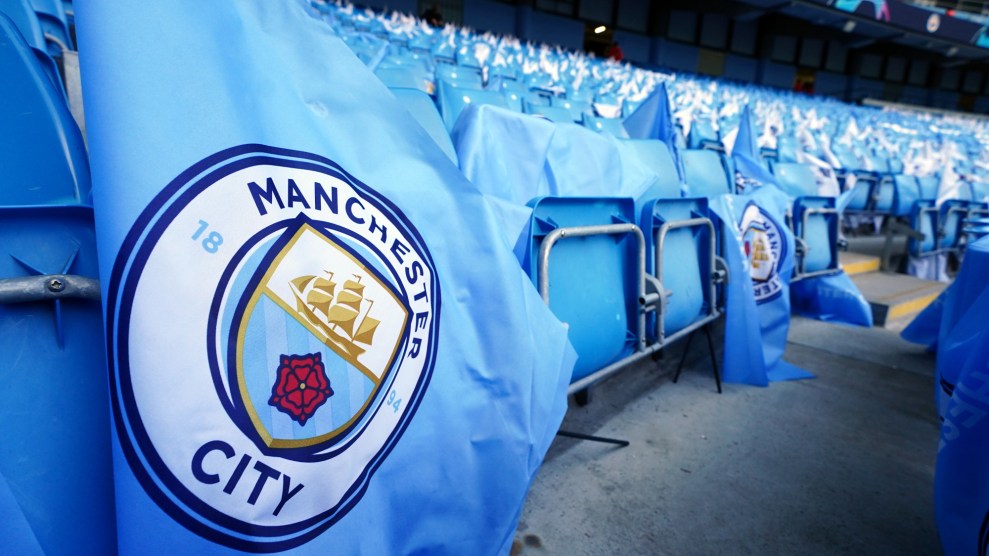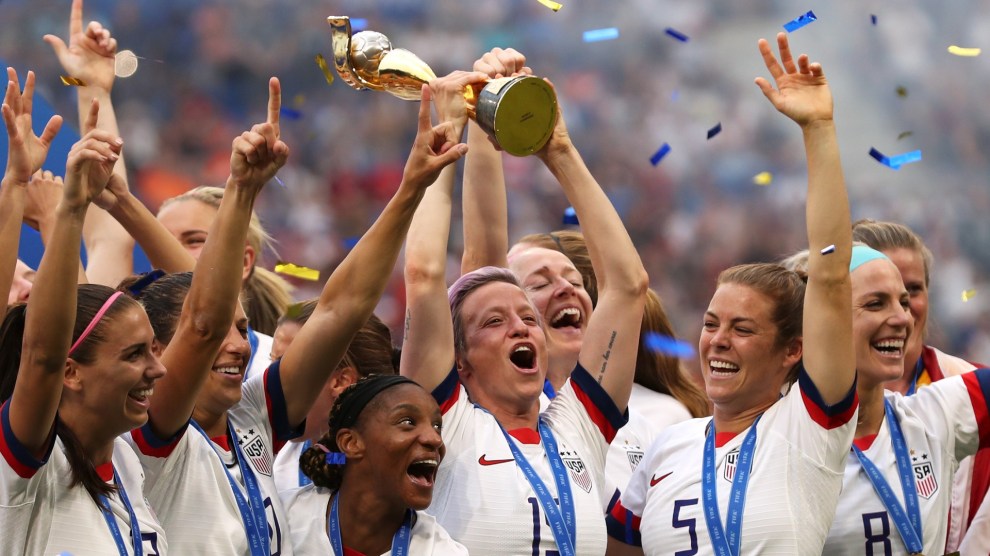
Jorge Vilda (left) and Luis Rubiales.Ane Frosaker / SPP / AP
Spain’s victory over England in last Sunday’s World Cup final was an exclamation point on the country’s rapid ascent in the hierarchy of women’s soccer. The country only qualified for its first women’s World Cup in 2015, and won its first match in the knockout stage of the competition just this month. But with a “Golden Generation” of world-class players, many of whom play club soccer together at reigning European champions FC Barcelona Femení, the squad’s triumph in Australia felt like something that had been in the works for quite a while.
Almost as soon as the celebrations started, though, the world got a glimpse of what else the Spanish players had overcome to get there—not just England, but a toxic, male-dominated national soccer federation. After Jenni Hermoso, one of the team’s stars, accepted her victor’s medal, Spanish soccer president Luis Rubiales put both of his hands behind her head, brought her toward him, and kissed her on the lips. He also grabbed his crotch during the trophy presentation. Hermoso said afterward that she “didn’t like” the kiss and wasn’t expecting it. Rubiales later offered a very partial apology (to “Her Majesty the Queen,” for the crotch grab), and El Pais reported that he was expected to resign.
Instead, he held a press conference in which he accused Hermoso of lying about the incident, and vowed to stay on. A roomful of men—including the national team manager, Jorge Vilda—applauded:
#ÚltimaHora ‼️ Luis Rubiales no dimitirá como presidente de la RFEF:
🗨️ "No voy a dimitir, no voy a dimitir". pic.twitter.com/VsHwl1T0mA
— Relevo (@relevo) August 25, 2023
In response, Hermoso and the entire World Cup-winning-side have announced they are boycotting the team. On Saturday, the sport’s global governing body, FIFA, which had stayed silent for days, announced that it was provisionally suspending Rubiales for 90 days, as soccer’s global governing body investigates whether the unwanted kiss violated “basic rules of decent conduct” prescribed in the organization’s bylaws.
But the Royal Spanish Football Federation, or RFEF, which oversees the national team, is still firmly siding with its president over the team that just won the World Cup. It responded to FIFA with a meandering, Trumpian statement once again attacking its own star player and calling her a liar. It threatened to sue Hermoso for defamation—and every other striking player for abandoning their duty: “[P]laying for the national team is an obligation on any member of the federation called upon to do so.”
It is genuinely surreal to watch a bunch of soccer bureaucrats treat their own world championship team like striking workers at a 19th-century coal mine. I have literally never seen anything like it. Except for the last time this happened to Spain.
Even by the standards of the rest of the sport, Spanish soccer is something of a misogynistic hell, and the current fight is in many the ways the continuation of an older one. Last year, following another disappointing exit from an international tournament, 15 top Spanish players sent identical emails to the federation, announcing that they would not play for the national team unless it made serious off-the-field changes. According to the Athletic, they complained of a lack of professionalism and poor and paternalistic treatment, with much of the criticism leveled at the national team manager, Jorge Vilda. Several other players did not recuse themselves from the team because they were already injured, but expressed their support as well—including Hermoso and Alexia Putellas, the two-time world player of the year.
The federation’s response to a mass protest from some of the best players in the world was instructive and ultimately prophetic. The manager who had failed to win a knockout game in three separate tournaments was “unquestionable,” the federation announced—and the dissenters would just have to apologize before they could return. Eventually, after some behind-the-scenes negotiations and talk of reform, some of them (but not all) did make their way back to the team. But the frustrations didn’t go away, and during the tournament, some players seemed to conspicuously avoid celebrating with their manager.
So this was the context of Rubiales’ postgame display. He was not just acting like a pig on his own account—it was part of a broader display of dominance. If the players wouldn’t recognize Vilda, the federation sure as hell would: At his infamous press conference, Rubiales announced that he was offering Vilda a new four-year contract, with a pay bump to boot. It was one “Fuck you,” layered on top of another.
“We’ve gone through a lot,” he told Vilda. “They’ve wanted to do to you the same thing that now they’re doing to me.”
Although Vilda’s alleged sins are of a much different nature, Rubiales’ behavior—using a championship celebration to taunt women who had the temerity to demand better—brought to mind Houston Astros assistant GM Brandon Taubman shouting at female reporters after Roberto Osuna, a pitcher who had been suspended for domestic violence, clinched a big playoff series. (“Thank God we got Osuna!,” he reportedly shouted. “I’m so fucking glad we got Osuna!”)
Rubiales is the reason we’re all talking about the Spanish soccer association’s internal politics and not about Olga Carmona’s tournament-winning goal, or the team’s fantastic play throughout the tournament. But everything that has happened since his apparently unwanted advance has made clear that Rubiales himself is just a symptom—that there are, in fact, a whole lot of Rubialeses out there, covering for each other’s depravity. Rubiales may have been suspended by FIFA, but he’s still a member in good standing of the executive committee of UEFA, the sport’s European governing body—in fact, that organization has still not even commented on the situation. (Nor did UEFA president Alexsander Ceferin even attend the final matchup between two UEFA members.)
At his press conference on Thursday, Rubiales’ assertion that Hermoso had in fact consented to the kiss—and that she therefore was lying about it now—was greeted with hearty applause from many of the men in the room. And there are so many men in the room with Rubiales: Of the 140 people who serve in the Spanish soccer federation, The Guardian’s Ashifa Kassam pointed out, there are barely enough women (six) to furnish a midfield. Luis de la Fuente, who manages Spain’s men’s national team, gave Rubiales a standing ovation.
The day before the Final, FIFA president Gianni Infantino, no stranger to insulting press conferences, directed a special message to women’s soccer players. “I say to all the women—and you know I have four daughters, so I have a few at home—I say to all the women that you have the power to change,” he said. “Pick the right battles, pick the right fights.” The message from the men controlling soccer’s institutions, by now, is a familiar one: Hey, sorry; we didn’t mean this fight.
















